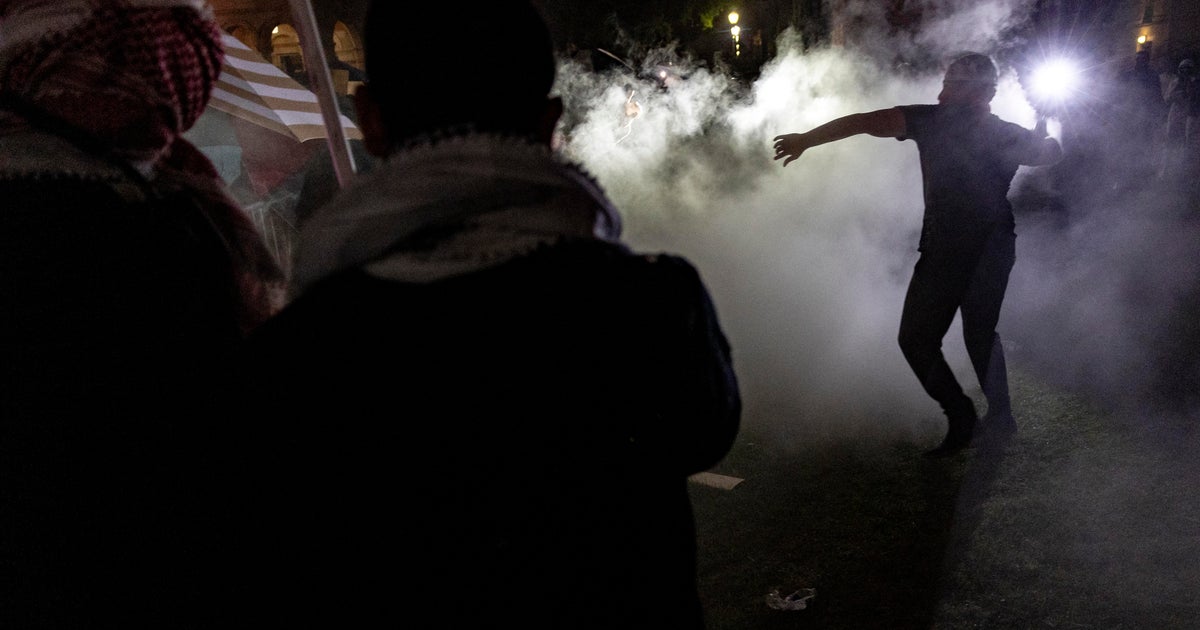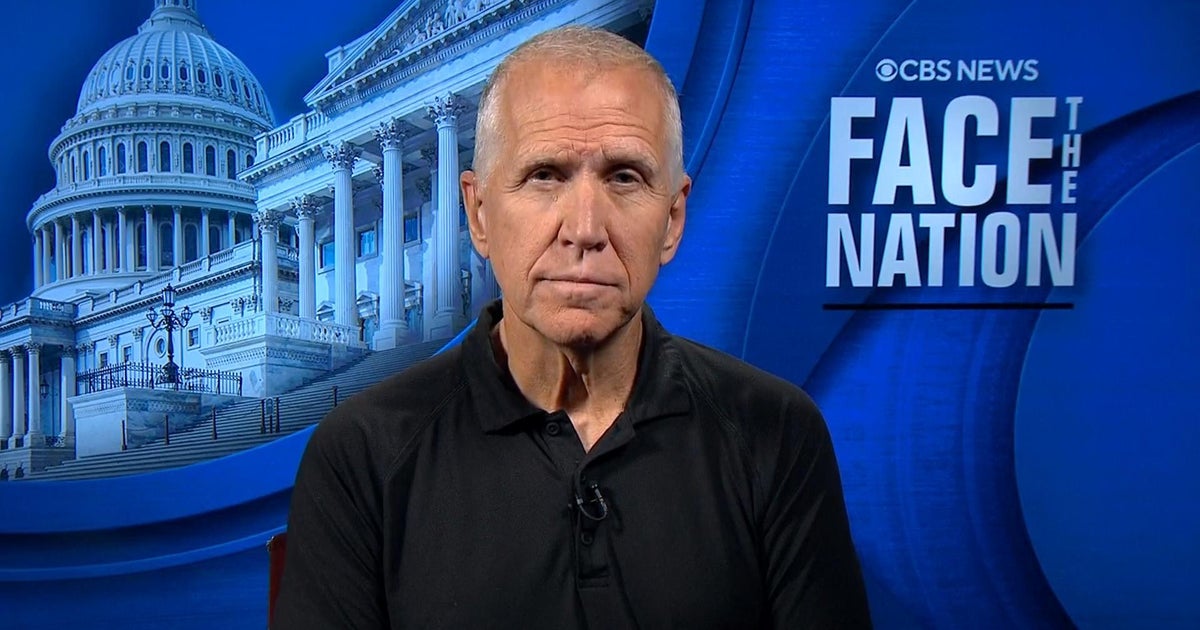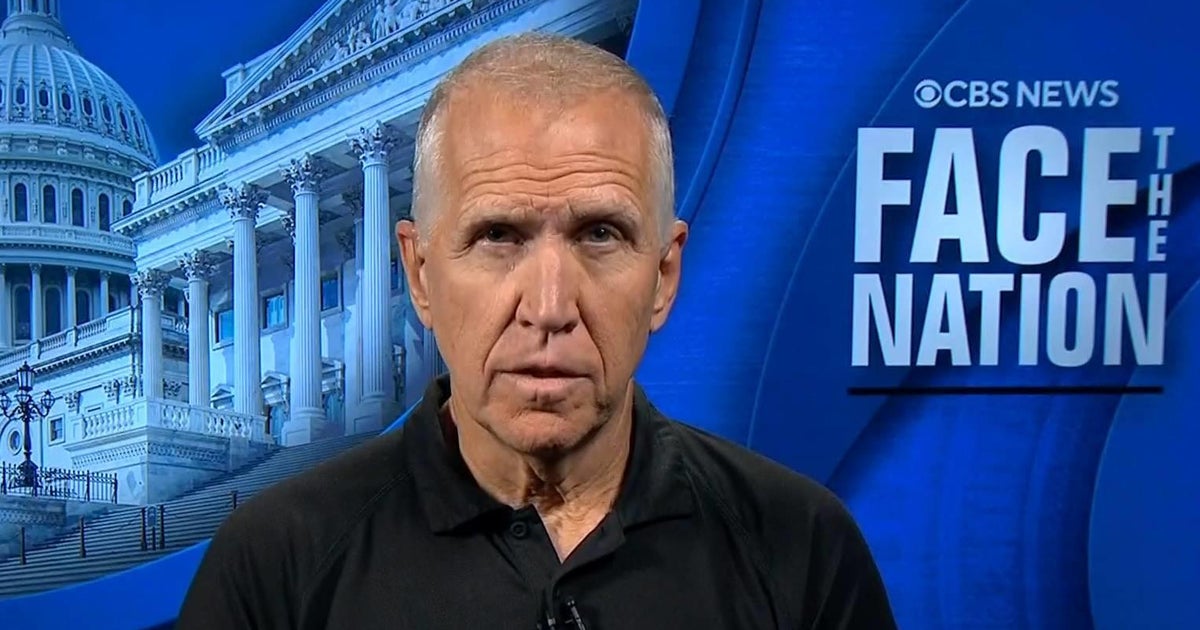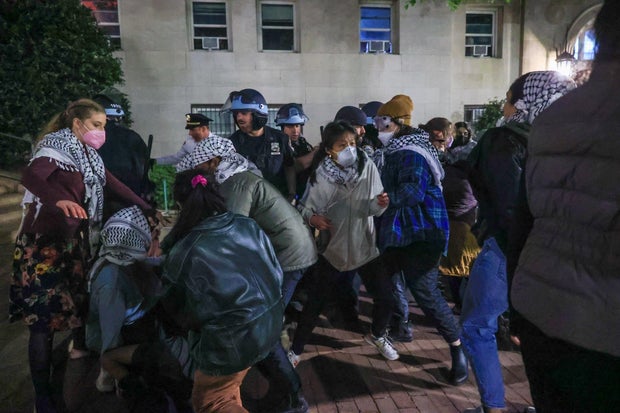CBS News
Violence erupts at some pro-Palestinian campus protests

The pro-Palestinian demonstration that paralyzed Columbia University ended in dramatic fashion, with police carrying riot shields bursting into a building that protesters took over the previous night and making dozens of arrests. On the other side of the country, clashes broke out early Wednesday between dueling groups at the University of California, Los Angeles (UCLA). And police and protesters clashed at the University of Arizona’s Tuscon campus, according to the Arizona Daily Star.
New York City officers entered Columbia’s campus late Tuesday after the university requested help, according to a statement released by a spokesperson. A tent encampment on the school’s grounds was cleared, along with Hamilton Hall where a stream of officers used a ladder to climb through a second-floor window to get in.
Selcuk Acar / Anadolu via Getty Images
Protesters calling on the Ivy League university to stop doing business with Israel or companies that support the war in Gaza had seized the hall about 20 hours earlier.
“After the University learned overnight that Hamilton Hall had been occupied, vandalized, and blockaded, we were left with no choice,” the school said. “The decision to reach out to the NYPD was in response to the actions of the protesters, not the cause they are championing. We have made it clear that the life of campus cannot be endlessly interrupted by protesters who violate the rules and the law.”
Police spokesman Carlos Nieves said he had no immediate reports of any injuries. The arrests occurred after protesters shrugged off an earlier ultimatum to abandon the encampment Monday or be suspended and unfolded as other universities stepped up efforts to end demonstrations that were inspired by Columbia.
Meanwhile, violence broke out at UCLA overnight between pro-Palestinian and pro-Israeli protesters. Police wearing face shields formed a line but didn’t immediately intervene.
People threw chairs and shoved and kicked one another. Some armed with sticks beat others. Before police arrived, a group piled on one person on the ground, kicking and beating the person until others pulled them out of the scrum.
ETIENNE LAURENT / AFP via Getty Images
“Horrific acts of violence occurred at the encampment tonight and we immediately called law enforcement for mutual aid support,” Mary Osako, a senior UCLA official, told the campus newspaper the Daily Bruin.
Los Angeles Mayor Karen Bass spoke to the university’s chancellor and said police would respond to the school’s request, according to a post on social media platform X from her spokesperson Zach Seidl.
The clashes took place just outside a tent encampment, where pro-Palestinian protesters erected barricades and plywood for protection – and counter-protesters tried to pull them down.
Security was tightened Tuesday at the campus after officials said there were “physical altercations” between factions of protesters.
Police have swept through other campuses across the U.S. over the last two weeks, leading to confrontations and more than 1,000 arrests. In rarer instances, university officials and protest leaders struck agreements to restrict the disruption to campus life and upcoming commencement ceremonies.
Just blocks away from Columbia, at The City College of New York, demonstrators were in a standoff with police outside the public college’s main gate. Video posted on social media by reporters on-scene late Tuesday showed officers putting some people to the ground and shoving others as they cleared people from the street and sidewalks. Many detained protesters were driven away on city buses.
After police arrived, officers lowered a Palestinian flag atop the City College flagpole, balled it up and tossed it to the ground before raising an American flag.
Brown University, another member of the Ivy League, reached an agreement Tuesday with protesters on its Rhode Island campus. Demonstrators said they would close their encampment in exchange for administrators taking a vote to consider divestment from Israel in October. The compromise appeared to mark the first time a U.S. college has agreed to vote on divestment in the wake of the protests.
The Arizona Daily Star says officers in riot gear and gas masks fired what they called non-lethal chemical munition weapons as they moved in on demonstrators at the University of Arizona’s Tucson campus. The paper says some arrests were made and “shoving matches break out between some protesters and advancing officers, and a barrage of items is thrown in the air, toward the officers, in the loud, chaotic scene” before protesters retreated and the encampment was broken up.
Columbia’s police action happened on the 56th anniversary of a similar move to quash an occupation of Hamilton Hall by students protesting racism and the Vietnam War.
The police department earlier Tuesday said officers wouldn’t enter the grounds without the college administration’s request or an imminent emergency. Now, law enforcement will be there through May 17, the end of the university’s commencement events.
In a letter to senior NYPD officials, Columbia President Minouche Shafik said the administration made the request that police remove protesters from the occupied building and a nearby tent encampment “with the utmost regret.”
Shafik also referenced the idea, first put forward by New York City Mayor Eric Adams earlier in the day, that the group that occupied Hamilton was “led by individuals who are not affiliated with the university.”
Neither provided specific evidence to back up that contention, which was disputed by protest organizers and participants.
NYPD officials made similar claims about “outside agitators” during the huge, grassroots demonstrations against racial injustice that erupted across the city after the death of George Floyd in 2020. In some instances, top police officials falsely labeled peaceful marches organized by well-known neighborhood activists as the work of violent extremists.
Before officers arrived at Columbia, the White House condemned the standoffs there and at California State Polytechnic University, Humboldt, where protesters had occupied two buildings for more than a week until officers with batons intervened early Tuesday and arrested 25 people.
President Biden believes students occupying an academic building is “absolutely the wrong approach,” said National Security Council spokesperson John Kirby.
Later, former President Donald Trump called into Sean Hannity’s show on the Fox News Channel to comment on Columbia’s turmoil as live footage of police clearing Hamilton Hall aired. Trump praised the officers. “But it should never have gotten to this,” he told Hannity.
The nationwide campus protests began at Columbia in response to Israel’s offensive in Gaza after Hamas launched a deadly attack on southern Israel on Oct. 7. Militants killed about 1,200 people, most of them civilians, and took roughly 250 hostages. Vowing to stamp out Hamas, Israel has killed more than 34,000 Palestinians in the Gaza Strip, according to the local health ministry.
As cease-fire negotiations appeared to gain steam, it wasn’t clear whether those talks would inspire an easing of protests.
Israel and its supporters have branded the university protests as antisemitic, while Israel’s critics say it uses those allegations to silence opposition. Although some protesters have been caught on camera making antisemitic remarks or violent threats, organizers of the protests, some of whom are Jewish, say it is a peaceful movement aimed at defending Palestinian rights and protesting the war.
CBS News
Sen. Thom Tillis says “the scope” of Helene damage in North Carolina “is more like Katrina”

Watch CBS News
Be the first to know
Get browser notifications for breaking news, live events, and exclusive reporting.
CBS News
Transcript: Sen. Thom Tillis on “Face the Nation with Margaret Brennan,” Oct. 6, 2024

The following is a transcript of an interview with Sen. Thom Tillis, Republican of North Carolina, on “Face the Nation with Margaret Brennan” that aired on Oct. 6, 2024.
MARGARET BRENNAN: We’re joined by North Carolina Republican senator Thom Tillis, his state is among six recovering from Hurricane Helene, and he joins us from Charlotte. Senator, I am sorry for the losses that you have experienced. 116 dead, your state hit the hardest here. What does North Carolina need?
SEN. THOM TILLIS (R-NC): We- we need increased attention. We need to con- continue to increase the surge of federal resources. I’m glad to see, finally, we’re getting movement out of Fort Liberty and out of Kentucky with the 82nd Airborne, 101st. This- this is unlike anything that we’ve seen in this state. The scope of it is the size of the state of Massachusetts, and we need all hands on deck.
MARGARET BRENNAN: Senator, I want to talk in depth about exactly what you need on the other side of this commercial break. Stay with us.
(ANNOUNCEMENTS)
MARGARET BRENNAN: Welcome back to “Face the Nation”. We continue with North Carolina Republican senator, Thom Tillis. Senator, before the break, you were telling us that you had finally seen some movement from the 82nd Airborne. I know President Biden had approved 1000 U.S. Army personnel to support the National Guard. What is happening as of today? Are those resources reaching who needs them?
SEN. TILLIS: They are beginning to move. I think they’re moving a little bit more slowly than I’d hope. That’s why we have- while we’re working with the ground, I want to thank all the local, state, federal responders out there. They’re doing extraordinary work. But we’ve got to plus up the resources out there into some of the hardest hit areas, areas that we haven’t even reached yet. And I for one, think that can be done through the- through the leadership of an active duty DOD personnel working with the state and- and with the National Guard. We just need to surge more resources. We’ve got to clear roads. Most roads, you still have to assume, are closed in western North Carolina. I’ve been out there twice this week. I’ll be out there every day- last week, every day this week. But just the basics of debris removal for rescue operations, things that the Department of Defense, the 82nd Airborne, the 101st, are accustomed to doing in battle situations are exactly what we need in western North Carolina.
MARGARET BRENNAN: So you would prefer the military be in the lead and not FEMA? Is that right?
SEN. TILLIS: What I believe is that it has to be a coordinated response, and FEMA knows how to do this well. They’ve done it in other major disaster events. The- the American people and people in North Carolina need to understand, the scope of this storm is more like Katrina. It may look like a flood to the outside observer, but again, this is a land mass roughly the size of the state of Massachusetts, with damage distributed throughout. We have to get the maximum resources on the ground immediately to finish rescue operations and then, sadly, be there for recovery and rebuilding.
MARGARET BRENNAN: I noticed that a state senator in North Carolina named Kevin Corbin had been posting on Facebook asking people to stop “conspiracy theory junk,” as he called it, including claims the government’s controlling the weather or stealing donation money. Who or what is fueling that kind of misinformation? And do you think it’s harming recovery efforts?
SEN. TILLIS: Well, Margaret, one- one people- I’ve been involved in a number of storm responses, and this is when I believe discipline is absolutely essential. Kevin is a friend of mine, and he’s right to call out people. Many of these- these observations are not even from people on the ground. I believe that we have to stay focused on rescue operations, recovery operations, clearing operations, and we don’t need any of these distractions on the ground. It’s at the expense of hard working first responders and people that are just trying to recover their lives. So I think they should listen to Kevin’s advice and do the same. Look, if there are any challenges, call my office. We’ll track them down if there are real issues. But quite honestly, most of what I’ve seen out there is a distraction and not helping the core of the effort right here, which is to save lives and- and start rebuilding.
MARGARET BRENNAN: Former President Trump claimed the federal response in North Carolina was terrible, and emergency funding is being spent on immigrants. Do you know what he’s talking about?
SEN. TILLIS: Well here, let’s- let’s- let’s stipulate the fact that–
MARGARET BRENNAN: Is he right?
SEN. TILLIS: I think that the President is right to say that billions of dollars is being spent as a result of Biden’s failed immigration policies and border policies. However, we have the resources that we need, we’re going to have to go back and pass more resources. We could have a discussion about the failure of this administration’s border policies and the billions of dollars it’s costing. But right now, not yet is it affecting the flow of resources to western North Carolina.
MARGARET BRENNAN: It is not an effector, to be clear? Okay.
SEN. TILLIS: Not at this time.
MARGARET BRENNAN: Okay. Homeland Security is projecting that FEMA can meet the immediate needs, but they’re not sure if we can make it all the way through hurricane season without more federal help. You’re asking for federal help, but the Speaker of the House is- has said he’s not calling people back early to vote to approve it. Are you going to try to persuade him otherwise when he comes to North Carolina this week?
SEN. TILLIS: Well, I think we have to look at it, because Margaret, we’ve got a storm that’s about to hit Florida that’s going to have additional FEMA surge resource requests over the next week or so. I mean, we’re talking about a major rain event that’s forming down in the Gulf Coast that’s supposed to hit the- two thirds of the state of Florida. Other events could actually draw those funds down. I’m in the camp of, let’s go back. We already know that we need additional resources. Let’s make sure that there’s never a second- there’s never attention drawn to whether or not they can move accounts around to respond to all these floods, not just in North Carolina, but the storm event. So I’m in the camp of, let’s go provide some certainty, then we can come back and do more after the election.
MARGARET BRENNAN: Well that election is coming soon, and it’s not the federal government that administers it, as you know, but we do know in your state, there are some concerns that Helene could impact the ability of North Carolinians to either vote in person or via absentee ballot. What is the state doing at this point? Does there need to be more attention to that?
SEN. TILLIS: The state’s doing a great job. I’ve spoken with Leader Berger and Speaker Moore and- and others in the legislature. They’re coming back this week. They’re taking lessons from Louisiana, a number of other states who have had to provide ballot access and voting access in difficult situations like this. They’ll be passing legislative matters this week to address it. I think that North Carolina will be prepared to make sure that everybody who wants to vote will have access to the ballot and vote before Election Day or on Election Day.
MARGARET BRENNAN: All right, Senator, a developing story we’ll continue to track. We’ll be right back.
CBS News
Transcript: Sen. Mark Kelly on “Face the Nation with Margaret Brennan,” Oct. 6, 2024

The following is a transcript of an interview with Sen. Mark Kelly, Democrat of Arizona, on “Face the Nation with Margaret Brennan” that aired on Oct. 6, 2024.
MARGARET BRENNAN: Joining us now is Arizona’s Democratic Senator, Mark Kelly. He’s in Detroit this morning on the campaign trail for the Harris campaign. Good morning to you, Senator.
SEN. MARK KELLY: Good morning, Margaret.
MARGARET BRENNAN: I want to talk to you about Arizona, but let’s start in Michigan, which is where you are right now. And it is going to be such a key state to a potential Harris or Trump victory. Vice President Harris is facing challenges among black men, working class people, as well as the Muslim and Arab populations skeptical of the White House support for Israel’s wars. What are you hearing on the ground there from voters?
SEN. KELLY: Well, my wife, Gabby Giffords, and I have been out here for a couple days. We’ve been campaigning across the country, Michigan, I’ve been in North Carolina, Georgia as well. I’ll be back to Arizona here soon. The vice president was out here speaking to Muslim organizations and the Arab community about what is at stake in this election and addressing the concerns that they have. What we’re hearing, issues about the economy, about gun violence, about, you know, supporting American families and the difference between Donald Trump and Kamala Harris. You know, Kamala Harris, who has a vision for the future of this country, Donald Trump, who just wants to drag us backwards.
MARGARET BRENNAN: Today in Dearborn, Michigan, there’s a funeral service for an American man who was killed in Lebanon by an Israeli airstrike. It just underscores how that community you’re talking about out in Michigan feel some of what’s happening in a personal way to their community. Given how close this race is, do you think this war and the expectation it could escalate could cost Democrats both a seat in the Senate and potentially the presidency?
SEN. KELLY: Margaret, nobody wants to see escalation and it’s tragic when any innocent person, whether it’s an American or Palestinian, lose their life in a conflict. Tomorrow’s one year since October 7th, when Israel was violently attacked. Israel has a right to defend itself, not only from Hamas, but from Hezbollah and from the Iranians. But, you know, I and my wife, you know, we feel for the community here who’s been affected by this. And that’s why the vice president was out here earlier, a few days ago, meeting with that community.
MARGARET BRENNAN: But it’s a live issue.
SEN. KELLY: Yeah, sure. I mean, there is an ongoing conflict in the Middle East. Israel is, you know, fighting a war now on, I think it’s fair to say, two fronts and then being attacked by the Iranians as well. And, they- they need to defend themselves, and we need to support our Israeli ally. At the same time, when women and children lose their life, innocent people in a conflict, it is- it is tragic.
MARGARET BRENNAN: You do sit on the Senate Intelligence Committee and so I know you know how intense the efforts are by foreign actors to try to manipulate voters going into November. Just this Friday, Matthew Olsen, the lead on election threats at the Department of Justice, told CBS the Russians are, quote, highlighting immigration as a wedge issue. That is such a key issue in Arizona. Are you seeing targeted information operations really focusing in on Arizonans right now?
SEN. KELLY: Not only in Arizona, in other battleground states. It’s the Russians, the Chinese, the Iranians, and it’s significant. And we need to do a better job getting the message out to the American people that there is a huge amount of misinformation. If you’re looking at stuff on Twitter, on TikTok, on Facebook, on Instagram, and it’s political in nature, and you may- might think that that person responding to that political article or who made that meme up is an American. It could be- it could look like a U.S. service member. There is a very reasonable chance I would put it in the 20 to 30% range, that the content you are seeing, the comments you are seeing, are coming from one of those three countries: Russia, Iran, China. We had a hearing recently, with the FBI director, the DNI, and the head of the National Security Agency. And we talked about this. And we talked about getting the word out. And it’s up to us, so thank you for asking me the question, because it’s up to us, the people who serve in Congress and the White House to get the information out there, that there is a tremendous amount of misinformation in this election, and it’s not going to stop on November 5th.
MARGARET BRENNAN: Understood. And we will do our best to help parse that for viewers. But on the topic of the border, President Biden did announce just this past week new regulations to keep in place that partial asylum ban that he rolled out back in June. That’s what’s credited with helping to bring down some of the border crossing numbers in recent weeks. It was supposed to be a temporary policy, dependent on how many people were crossing at a time. Do you think this is the right long term policy, or is this just a gimmick to bring down numbers ahead of the election?
SEN. KELLY: Well, the right long term policy is to do this through legislation. And we were a day or two away from doing that, passing strong border security legislation supported by the vice president, negotiated by the vice president, and the president and his Department of Homeland Security, with Democrats and Republicans–
MARGARET BRENNAN: But this is not legislation.
SEN. KELLY: –This is bipartisan. This isn’t. But the legislation was killed by Donald Trump. We were really close to getting it passed. That’s the correct way to do this. When you can’t do that, Margaret, when a former president interrupts the legislative process the way he did, which is the most hypocritical thing I’ve ever seen in my three and a half years in the Senate. After that happened, the only other option is executive actions. And this has gone from what was chaos and a crisis at our southern border to somewhat manageable. And if you’re the border- Border Patrol, you know, this is this- you need this. I mean, otherwise it is unsafe for Border Patrol agents, for CBP officers, for migrants, for communities in southern Arizona. So it’s unfortunate that this was the- these were the steps that had to be taken.
MARGARET BRENNAN: Okay.
SEN. KELLY: But that’s because the former president didn’t allow us to do this through legislation.
MARGARET BRENNAN: Senator, we have to leave it right there. Face the Nation will be right back.









